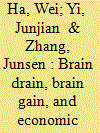| Srl | Item |
| 1 |
ID:
147441


|
|
|
|
|
| Summary/Abstract |
We have used Chinese provincial data (1980–2005) to examine the effects of permanent and temporary emigration on human capital formation and economic growth in source regions. First, we find that permanent emigration is conducive to the improvement of both middle and high school enrollment. In contrast, while temporary emigration has a significantly positive effect on middle school enrollment it does not affect high school enrollment. Moreover, the different educational attainments of temporary emigrants have different effects on school enrollment. Specifically, the proportion of temporary emigrants with high school education positively affects middle school enrollment, while the proportion of temporary emigrants with middle school education negatively affects high school enrollment. Finally, we find that both permanent and temporary emigration has a detrimental effect on the economic growth of source regions.
|
|
|
|
|
|
|
|
|
|
|
|
|
|
|
|
| 2 |
ID:
147409


|
|
|
|
|
| Summary/Abstract |
Using a newly constructed panel dataset that covers the 14-year period from 1997 to 2011 for more than 100 villages in China, this study analyzes the dynamic effect of rural-to-urban migration on inequality in source villages. Given that income inequality is time persisting, we use a system GMM framework. We found that the dynamic relationship between migration and income inequality is inversely U-shaped. Specifically, contemporary migration increases income inequality, whereas lagged migration has a strong income inequality-reducing effect on the sending villages. A 50 percent increase in the lagged migration rate translates into a one-ninth to one-tenth standard deviation reduction in income inequality.
|
|
|
|
|
|
|
|
|
|
|
|
|
|
|
|